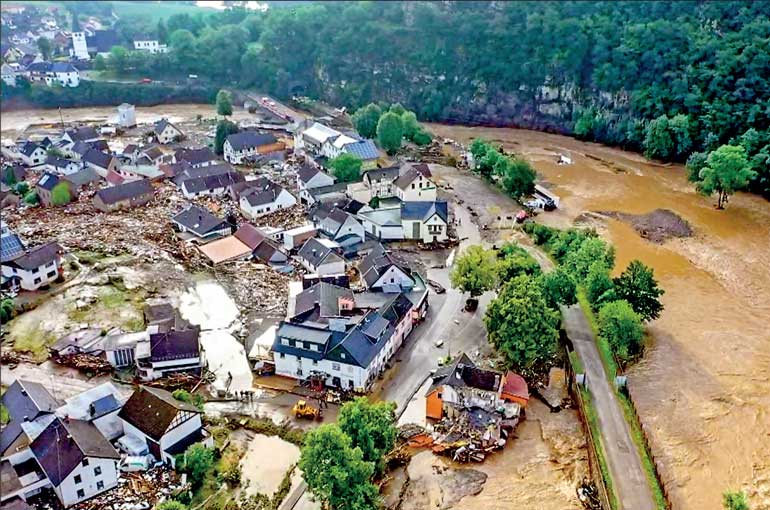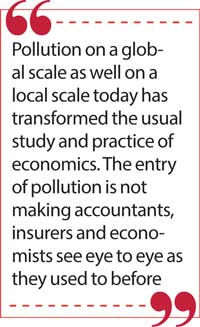Tuesday Feb 17, 2026
Tuesday Feb 17, 2026
Thursday, 22 July 2021 00:00 - - {{hitsCtrl.values.hits}}

News from Germany indicates that billions of euros will be spent on rebuilding but one thing to understand is if such events continue to recur, and that is what the predictions are, there may not be any respite to build again before the next episode or the money supply may not be sufficient
 As we read this we have a breaking story from Germany. Not much more than 150 mm rain but persistent over a period had led to severe floods resulting in some significant misery and loss of lives. The visuals are quite horrific. The issue has placed climate change well into the ongoing political campaign as a result, not that Germans are ignorant or averse to taking pro-climate decisions.
As we read this we have a breaking story from Germany. Not much more than 150 mm rain but persistent over a period had led to severe floods resulting in some significant misery and loss of lives. The visuals are quite horrific. The issue has placed climate change well into the ongoing political campaign as a result, not that Germans are ignorant or averse to taking pro-climate decisions.
In Sri Lanka, the X-Press Pearl as a shipwreck with cargo still on board is extending its pollution episode for over two months now. Each passing day is adding to pollution and with so many unknowns. The State is engaged in damage assessment and at present it is an assessment where closure cannot be made. With new scientific information as well as environmental economic valuation methods the damage assessment is expected to come to light.
Pollution on a global scale as well on a local scale today has transformed the usual study and practice of economics. The entry of pollution is not making accountants, insurers and economists see eye to eye as they used to before.
Bouncing back
News from Germany indicates that billions of euros will be spent on rebuilding but one thing to understand is if such events continue to recur, and that is what the predictions are, there may not be any respite to build again before the next episode or the money supply may not be sufficient.
This is why still the developed world can take care of these incidents. However, developing countries are unlikely to have this luxury of bouncing back easily. Hence the argument that developed countries would suffer less from climate change issues at this stage leaving developing nations to suffer most. However, it was the nature and the pathway of development pursued by the developed countries that had led to this scenario.
Unfortunately, though some in developing economies are quite keen to point this fact when all are expected to tighten their climate responsive belt, looking as one human species and one planet, societies in developing nations really do not have the option of pursuing the old path of development today.
Development
Pollution has fairly and squarely placed a spanner in the development works that cannot be ignored or argued away with such logic. That is why the usual GDP is becoming irrelevant yet we continue to discuss our economic story in that manner with Bhutan exempted!
Kenneth Boulding, an economist, had pronounced that anyone who believes in indefinite growth in anything physical, on a physically finite planet, is either madman or an economist. The mantra of growth figures and spending an inordinate time over revising what had been indicated before is now a demonstration of wrong mindsets in action. Some may ask, what else could we do? That is where the leadership with vistas are necessary.
The era of Milton Friedman economics was simple with direction quite clear. You run your organisation to realise what is best for your shareholders. The word stakeholders were not quite in vogue. Friedman economic theory was simply what was to be followed. Of course the foundation of such economics was laid when classical economists like Ricardo identified the theory of comparative advantage.
As per Ricardo, China should be doing well if it produces porcelain and tea and UK should engage in making machine parts. Interesting to see how practices have changed. Such were the economics of the day. Resources were considered to exist in plentiful supply and Johan Rockstrom’s planetary limits were not heard of.
Pollution was a sign of growth as people decided to come to towns and they simply honed in on to places where chimneys spewing plenty of smoke and at all times were present. Smell of soot was smell of potential income. The visuals did not project to most of the minds a sign of pollution or danger. There was no pollution in economics. Humans were a factor of production known as labour.
Pollution
It was around the 1950s pollution really reared its ugly head. In United States a river even caught fire and buried chemicals around the love canal brought in death and misery. London and Donora witnessed death by inhalation and the word smog entered into the vocabulary – smoke-induced fog. The pollution genie was out. Addressing the issue was proving not be an easy task.
When the astronauts from Apollo 8 sent in the now famous Earthrise picture there was widespread warming of hearts for the fragile planet. Businesses suddenly had to identify that business of business is not just business. The science was ridiculed and those scientists who were coming out with findings of environmental pollution were publicly ridiculed and companies set aside specific budgetary provisions to fight them rather than addressing the emerging issues.
Though there were some early successes for such types of expenditure, results continue to pile up and there was no escaping the fact that pollution was real and life threatening. Today the somewhat simpler ‘life threatening’ has scaled up to the situation of ‘planetary threat’. This fact was echoed quite recently by the Secretary-General of United Nations. We are in a crisis period brought in by multitude of pollution scenarios, some local, some regional and quite a few global.
Enlightenment
The paradigm shifts in economics required did happen and it was not polluting economics but enlightenment! Economics went on to embrace ecological science and ethics. ‘Toward a Steady State Economy’ by Herman Daly and Kenneth Townsend started this shift by addressing the usual prescription of continued economic growth among issues of underdevelopment and equity.
Perhaps it was quite hard for many to accept that there are limits to growth. When profits were understood as just reward for taking risks the concept of risking the only place that you have to live now have to be factored into. One had to look at future with a new lens and understand that what you are doing have an impact on those who are to follow you.
The big understanding of that they would have to pay for your omissions and mistakes became a serious factor in decision making. The development was out and sustainable development was in when Gro Harlem Brundtland defined this concept beautifully.
Time to act is with us today with all of us in the final decade of sustainability. Definitely well before 2030 whether we are doing right or wrong would be indicated to us. However, as the events in Germany and Belgium indicate for the moment we are not there with a pass mark on our report card.
 Valuing the earth
Valuing the earth
Daly and Townsend went on to describe valuing the earth. World Bank has developed its own system WAVES – Wealth Accounting and Valuing Eco System resources. WB’s Green Book of Data makes fascinating reading.
Going through that you begin to understand the hard work of bees in dollar terms as well as the contribution of mangroves in a similar manner. However, WAVES still is not mainstream. Only a few countries and one prominent country Costa Rica has adopted the method.
Traditionally those who acted in a way to maximise the value for themselves were highly valued. In quite simple terms still one may go ahead with a statement of coal power stations and its lower unit cost of electricity as quite helpful. So many issues have been placed outside the ambit of calculations when one comes out with the statement that coal is still our best choice for lower electricity cost.
Today we understand coal power generation as the most contributory source of mercury to the atmosphere when taking man-made activities. Are we placing the cost of mercury emissions to humans and the environment in this cost of unit of electricity? The answer is no. Therein lies the problem of classical calculations and ignoring the knowledge given by environmental economics.
The issue is at the moment is all such costs are not internalised. It is in this stage that we are in today. The knowledge is present but minus the understanding across all parties, hence not applied. As such the decision making is not helpful towards moving down the path that we really need to at present.
Environmental economists are not mainstream economists who sit in places where decisions are made. When one hears discussions while one moves down corridors of power you begin to understand at present we are not there at all where we should be in serving the planet and in ensuring that our decisions of today understand our responsibilities for the future generations.